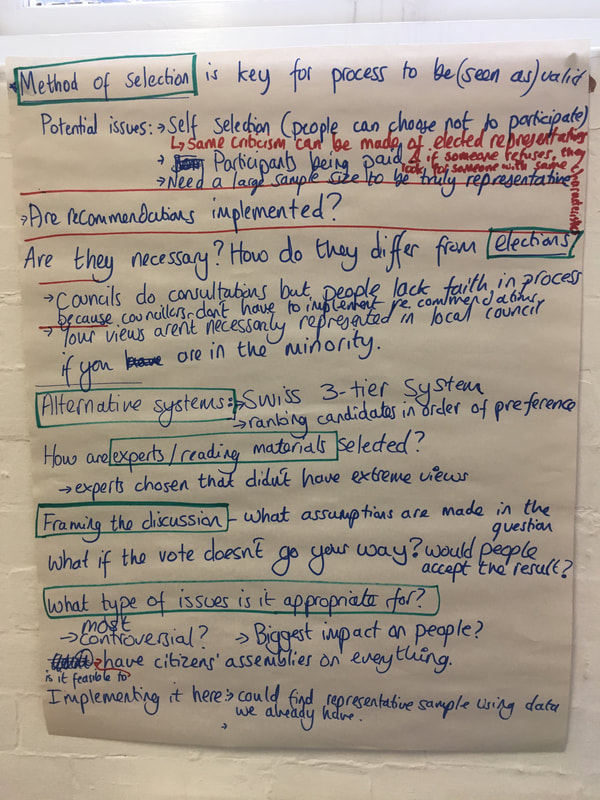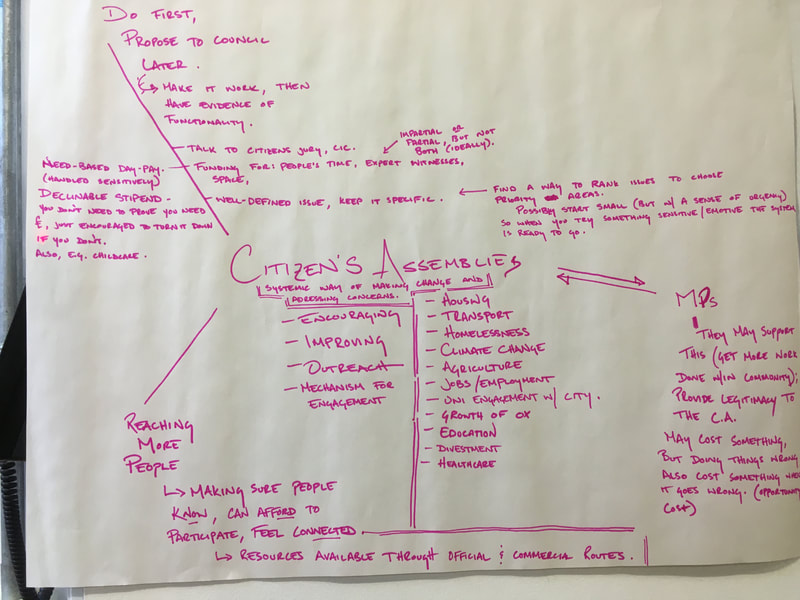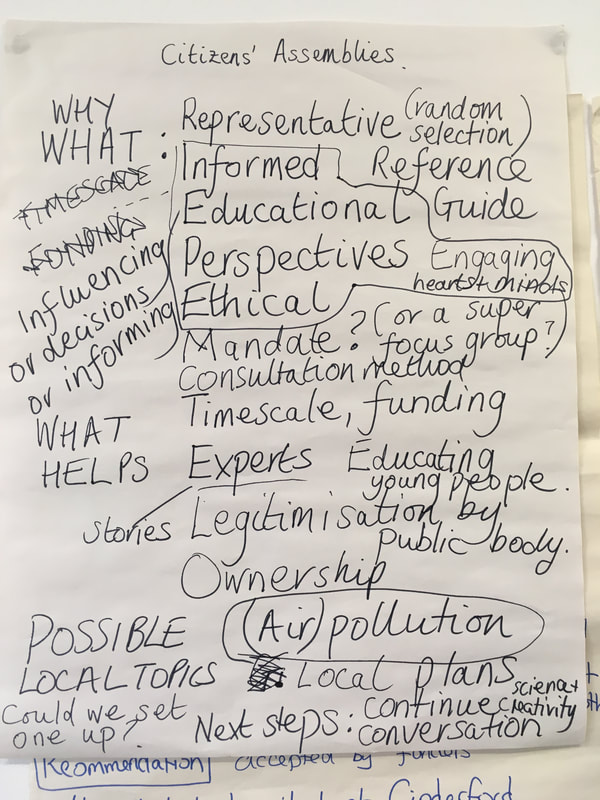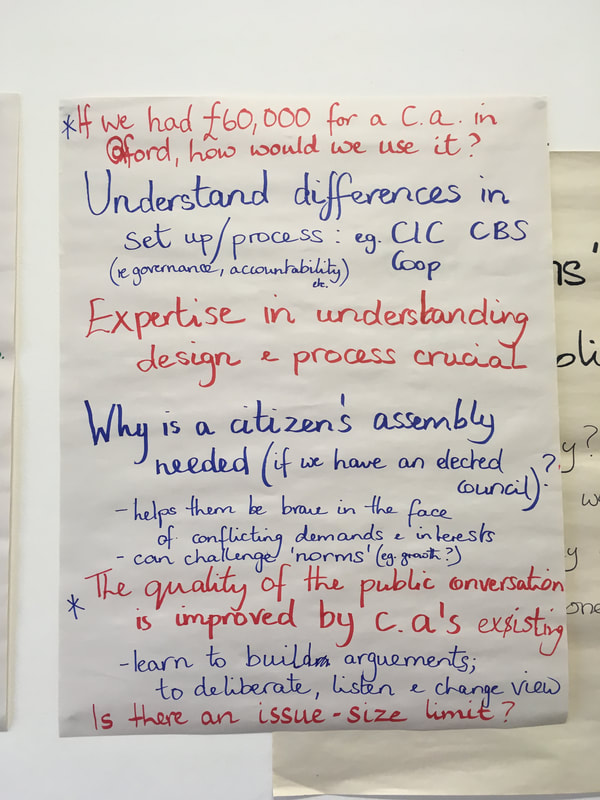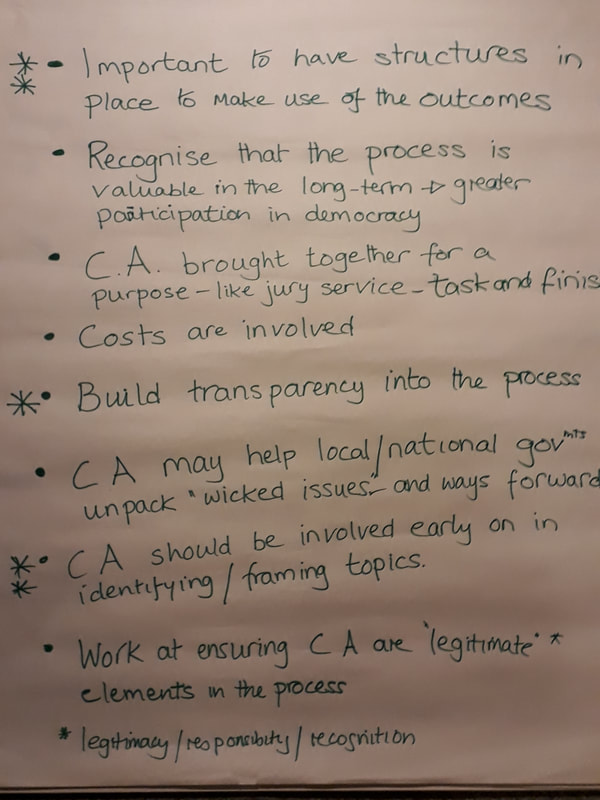Fourth meeting of the Oxford Democracy Cafe
12th January 2019
12th January 2019
Citizens' Assemblies was the topic for discussion at the fourth meeting of the Oxford Democracy Café on Saturday 12 January.
In previous meetings we had begun to consider alternatives to our current democratic systems, in particular participative democracy. These discussions led us to the topic of Citizens' Assemblies for the fourth meeting of the Oxford Democracy Café on Saturday 12 January at The Old Fire Station. In particular we considered
What are they?
How do they work?
Where have they worked?
Could we set one up here?
This was both a popular and a timely topic which brought 38 people to the café, many of them new to ODC.
In a change from our usual format participants were initially invited to read posters outlining four Citizens’ Assemblies (Juries) which have already taken place within the British Isles. They were chosen to represent the variety of issues that Citizens’ Assemblies can tackle and the different possible scale of decision making.
Participants then broke into small groups where each person contributed their thoughts / questions about what they had read before a group discussion. The main points from these discussions (see notes and photos below for more detail) were then taken forward to the plenary.
Discussion centred on the nuts and bolts of how to set up Citizens’ Assemblies (CAs), the range of different ways they have been used and could be used, how they differ from elected representatives, and what is gained by their use. Many ideas were put forward for possible topics for CAs both nationally and locally. One group suggested we set up a CA here in Oxford, and not wait for the local council to decide they were a good idea.
The plenary was followed by a report back session where a councillor in Oxford City Council’s Carfax ward reported back on the consultations he has had with his electorate on how to spend his allocated ward budget. A member of the group also reported back on the conference she attended in December Citizens Assemblies - Time to Renew European Democracy.
Finally the question as to what we could do locally had generated so much enthusiasm that it was decided to set up a sub-group of the Café to develop ideas and ways and means for a CA in Oxford. This group will meet on 7th Feb and report back to the next ODC.
In previous meetings we had begun to consider alternatives to our current democratic systems, in particular participative democracy. These discussions led us to the topic of Citizens' Assemblies for the fourth meeting of the Oxford Democracy Café on Saturday 12 January at The Old Fire Station. In particular we considered
What are they?
How do they work?
Where have they worked?
Could we set one up here?
This was both a popular and a timely topic which brought 38 people to the café, many of them new to ODC.
In a change from our usual format participants were initially invited to read posters outlining four Citizens’ Assemblies (Juries) which have already taken place within the British Isles. They were chosen to represent the variety of issues that Citizens’ Assemblies can tackle and the different possible scale of decision making.
- ‘How the State can make Ireland a leader in tackling climate change’ Citizens’ Assembly set up by the Irish Government. Report and recommendations published 2018 https://www.citizensassembly.ie/en/How-the-State-can-make-Ireland-a-leader-in-tackling-climate-change/Final-Report-on-how-the-State-can-make-Ireland-a-leader-in-tackling-climate-change/Climate-Change-Report-Final.pdf
- ‘How adult social care in England should be funded long term‘ The Health and Social Care Select Committee and the Housing, Communities and Local Government Select Committee commissioned the Citizens’ Assembly as part of their joint inquiry into the long-term funding of adult social care. 2018 https://publications.parliament.uk/pa/cm201719/cmselect/cmcomloc/citizens-assembly-report.pdf
- Citizens’ Assembly on Brexit. The project was led by the Constitution Unit at UCL 2017 http://citizensassembly.co.uk/wp-content/uploads/2017/12/Citizens-Assembly-on-Brexit-Report.pdf
- ‘Recommend the location of the new community hospital for the Forest of Dean (either Cinderford, Coleford or Lydney)’ Citizen’s Jury commissioned by Gloucestershire Care Services NHS Trust and NHS Gloucestershire Clinical Commissioning Group. 2018 https://citizensjuries.org/citizens-juries-2/forest-of-dean-citizens-jury/
Participants then broke into small groups where each person contributed their thoughts / questions about what they had read before a group discussion. The main points from these discussions (see notes and photos below for more detail) were then taken forward to the plenary.
Discussion centred on the nuts and bolts of how to set up Citizens’ Assemblies (CAs), the range of different ways they have been used and could be used, how they differ from elected representatives, and what is gained by their use. Many ideas were put forward for possible topics for CAs both nationally and locally. One group suggested we set up a CA here in Oxford, and not wait for the local council to decide they were a good idea.
The plenary was followed by a report back session where a councillor in Oxford City Council’s Carfax ward reported back on the consultations he has had with his electorate on how to spend his allocated ward budget. A member of the group also reported back on the conference she attended in December Citizens Assemblies - Time to Renew European Democracy.
Finally the question as to what we could do locally had generated so much enthusiasm that it was decided to set up a sub-group of the Café to develop ideas and ways and means for a CA in Oxford. This group will meet on 7th Feb and report back to the next ODC.
Notes from group discussions
OXFORD DEMOCRACY CAFÉ. Meeting January 12th, 2019.
SUMMARY of small group discussions.
Continuing a key concern of previous meetings about alternatives to our current democratic systems, especially participative democracy, for this Café our topic was
CITIZENS’ ASSEMBLIES
Following a preliminary viewing of flip chart poster presentations and informal discussion about a range of CAs already held [see links on ODC website], and which seemed to have worked, 5 groups discussed these questions.
What are they, and how do they work?
Issues raised about basic essentials:
Questions raised
Processes of CAs
Q: If we had £60,000 in Oxford for a CA how would we use it?
Substance/topics of CAs
Housing
Transport
Homelessness
Climate change
Agriculture
Jobs/employment
Local
Pollution [air]
Local plans for development/growth
University engagement with the city
Education
Divestment
Healthcare
How do CAs differ from elected representatives/local councils; what might the relationship between them be?
One group suggested doing a CA first, make it work and then propose it to the local Council.
Others proposed some sort of partnership between a CA and the local council whereby a CA on “wicked issues” could add value and legitimacy.
Could we set one up here?
This question generated a lot of enthusiasm resulting in the setting up of a sub-group of the Café to develop ideas and ways and means for a CA in Oxford.
Alternatives to CAs/other ways of doing democracy
SUMMARY of small group discussions.
Continuing a key concern of previous meetings about alternatives to our current democratic systems, especially participative democracy, for this Café our topic was
CITIZENS’ ASSEMBLIES
- What are they?
- How do they work?
- Where have they worked? – see ODC website for links
- Could we set one up here?
Following a preliminary viewing of flip chart poster presentations and informal discussion about a range of CAs already held [see links on ODC website], and which seemed to have worked, 5 groups discussed these questions.
What are they, and how do they work?
Issues raised about basic essentials:
- Membership should be chosen at random to reflect the population, e.g. from electoral rolls.
- Expertise needed for both design and process
- Aims to be clear and transparent
- Aim for consensus
- What is to happen to findings/recommendations need to be clear and transparent
- Legitimacy is essential
- Ownership - from examples it seemed commitment was high among participants; very little drop out.
Questions raised
- Does a CA need to have a mandate?
- Is it about influencing decisions or informing?
- How are experts/evidence/reading material to be selected?
- Is there voting? What if a vote doesn’t go your way?
- Is there a size limit?
- Is there an optimum timescale?
- For what type of issues is a CA appropriate?
- How are they funded?
Processes of CAs
- Transparency and legitimacy essential throughout
- Every member’s contribution/views are respected
- CA should be involved in identifying and/or framing topic/s
- Valuable in the immediate term to help solve problems
- Value in the long term
- encourages active participation in democratic processes
- reaches more people
- improves quality of the public conversation by learning to build arguments, deliberate, listen and be prepared to change one’s views
- Educational in both short and long term
Q: If we had £60,000 in Oxford for a CA how would we use it?
Substance/topics of CAs
Housing
Transport
Homelessness
Climate change
Agriculture
Jobs/employment
Local
Pollution [air]
Local plans for development/growth
University engagement with the city
Education
Divestment
Healthcare
How do CAs differ from elected representatives/local councils; what might the relationship between them be?
One group suggested doing a CA first, make it work and then propose it to the local Council.
Others proposed some sort of partnership between a CA and the local council whereby a CA on “wicked issues” could add value and legitimacy.
Could we set one up here?
This question generated a lot of enthusiasm resulting in the setting up of a sub-group of the Café to develop ideas and ways and means for a CA in Oxford.
Alternatives to CAs/other ways of doing democracy
- Representative – electing representatives to the local council
- Participative - 3-tier systems of referenda, as in Switzerland.

